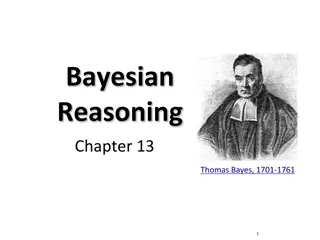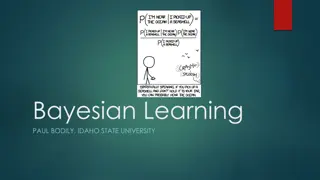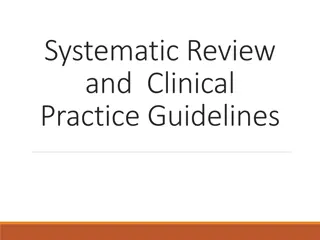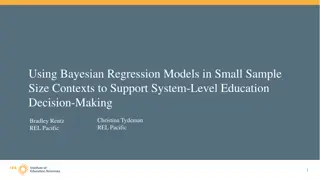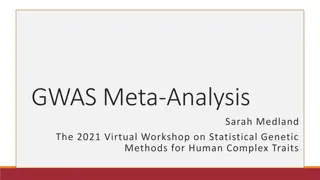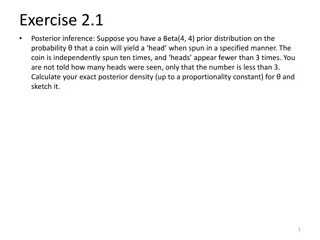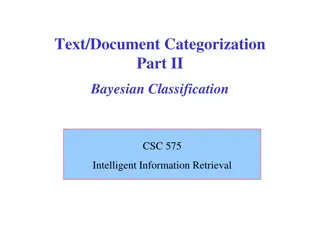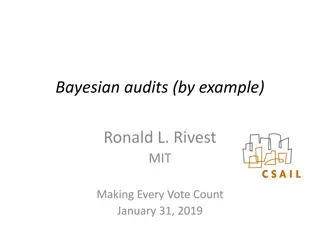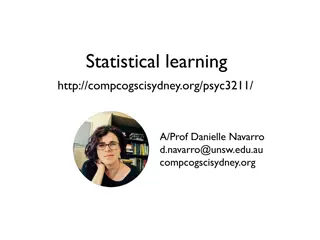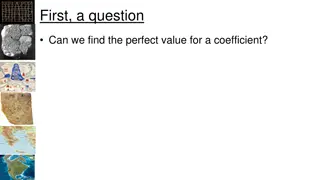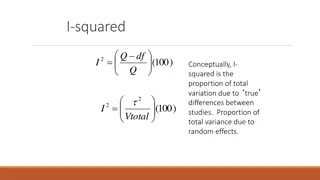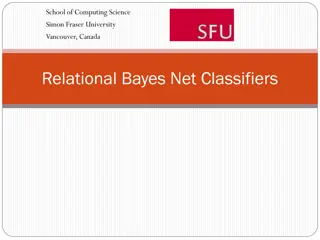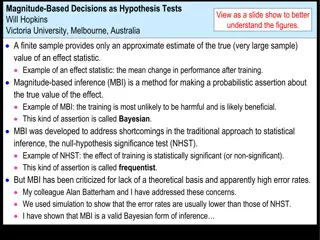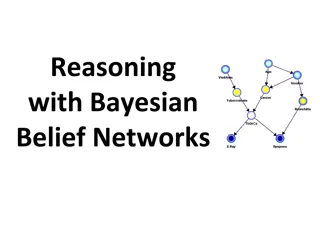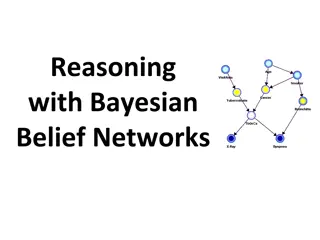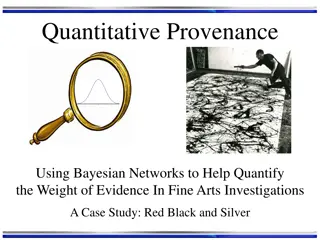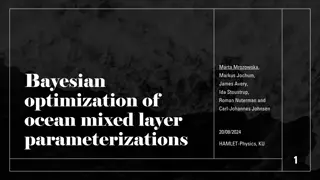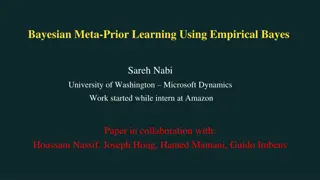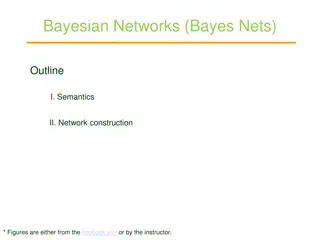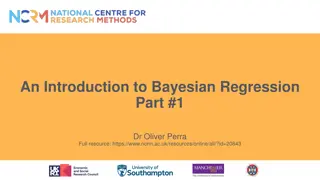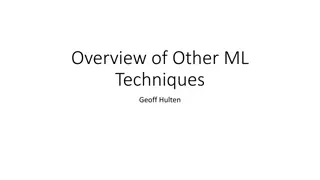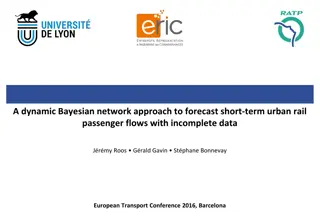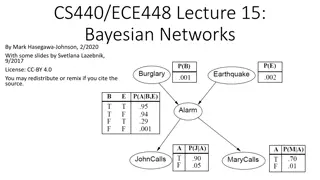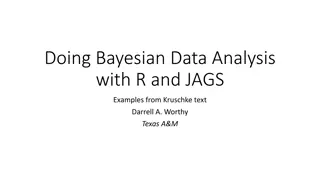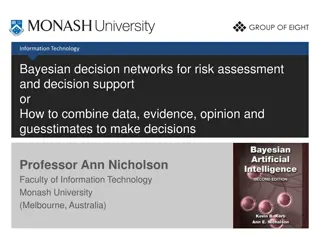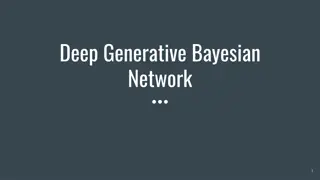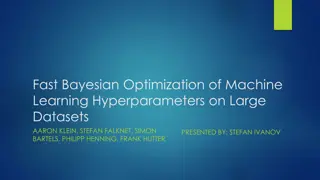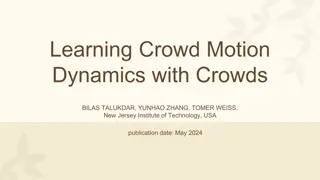Introduction to Meta-analysis in Stata
This workshop, presented by Dr. Christine R. Wells from UCLA, provides an in-depth exploration of meta-analysis in Stata. Participants will learn about systematic reviews, data collection and organization, running meta-analyses, interpreting results, creating graphs, and identifying biases. The focu
2 views • 181 slides
Understanding Bayesian Reasoning and Decision Making with Uncertainty
Exploring Bayesian reasoning principles such as Bayesian inference and Naïve Bayes algorithm in the context of uncertainty. The content covers the sources of uncertainty, decision-making strategies, and practical examples like predicting alarm events based on probabilities.
0 views • 32 slides
Understanding Bayesian Learning in Machine Learning
Bayesian learning is a powerful approach in machine learning that involves combining data likelihood with prior knowledge to make decisions. It includes Bayesian classification, where the posterior probability of an output class given input data is calculated using Bayes Rule. Understanding Bayesian
0 views • 17 slides
Understanding Systematic Reviews, Meta-analysis, and Clinical Practice Guidelines
Explore the importance of systematic reviews, critical appraisal questions, meta-analysis, and clinical practice guidelines in the healthcare field. Learn about the process of appraising systematic reviews, the significance of meta-analysis, and the benefits of following clinical practice guidelines
1 views • 16 slides
Utilizing Bayesian Regression Models for Small Sample Education Decision-Making
Bayesian regression models can be valuable tools for addressing the challenges of small sample sizes in educational research, particularly in the Pacific Region where data availability is limited. These models offer advantages for conducting robust analyses and informing system-level education decis
2 views • 25 slides
Comprehensive Overview of Admetan: A New Meta-Analysis Command
This meta-analysis command, Admetan, introduced by David Fisher from MRC Clinical Trials Unit at UCL, offers a comprehensive analysis of combining results from independent studies. It builds on the history of meta-analysis in Stata and aims to enhance capabilities for researchers. Admetan provides f
1 views • 19 slides
Meta-Analysis in GWAS: Methods and Applications
Meta-analysis in GWAS involves combining data across studies to estimate overall effects, explore cohort differences, improve power, and replicate findings. It includes joint vs. meta-analysis, methods, and types such as fixed effect and random effect meta-analyses.
0 views • 20 slides
Bayesian Inference with Beta Prior in Coin Toss Experiment
Suppose you have a Beta(4,.4) prior distribution on the probability of a coin yielding a head. After spinning the coin ten times and observing fewer than 3 heads, the exact posterior density is calculated. The posterior distribution is plotted and analyzed, showing how the prior influences the updat
7 views • 15 slides
Bayesian Approach in Pediatric Cancer Clinical Trials
Pediatric cancer clinical trials benefit from Bayesian analysis, allowing for the incorporation of uncertainty in prior knowledge and ensuring more informed decision-making. The use of Bayesian methods in the development of cancer drugs for children and adolescents, as emphasized by initiatives like
0 views • 26 slides
Meta's Role in Amplifying Anti-Rohingya Hate on Facebook
The investigation findings reveal Meta's failure to address hate speech and incitement against the Rohingya people on Facebook, resulting in a platform that amplified and promoted harmful content. Despite admitting in 2018 that more needed to be done, Meta's business model of data collection and eng
4 views • 7 slides
Understanding Bayesian Reasoning: A Comprehensive Overview
Bayesian reasoning involves utilizing probabilities to make inferences and decisions in the face of uncertainty. This approach allows for causal reasoning, decision-making under uncertainty, and prediction based on available evidence. The concept of Bayesian Belief Networks is explored, along with t
1 views • 33 slides
Bayesian Classification and Intelligent Information Retrieval
Bayesian classification involves methods based on probability theory, with Bayes' theorem playing a critical role in probabilistic learning and categorization. It utilizes prior and posterior probability distributions to determine category given a description. Intelligent Information Retrieval compl
0 views • 19 slides
Understanding Bayesian Audits in Election Processes
Bayesian audits, introduced by Ronald L. Rivest, offer a method to validate election results by sampling and analyzing paper ballots. They address the probability of incorrect winners being accepted and the upset probability of reported winners losing if all ballots were examined. The Bayesian metho
2 views • 7 slides
Exploring Statistical Learning and Bayesian Reasoning in Cognitive Science
Delve into the fascinating realms of statistical learning and Bayesian reasoning in the context of cognitive science. Uncover the intricacies of neural networks, one-shot generalization puzzles, and the fusion of Bayesian cognitive models with machine learning. Discover how these concepts shed light
0 views • 58 slides
Understanding Bayesian Methods for Probability Estimation
Bayesian methods facilitate updating probabilities based on new information, allowing integration of diverse data types. Bayes' Theorem forms the basis, with examples like landslide prediction illustrating its application. Prior and posterior probabilities, likelihood, and Bayesian modeling concepts
0 views • 13 slides
Meta-programming in Haskell: A Closer Look at Splices and Quotations
Explore the world of meta-programming in Haskell through splices and quotations. Learn about successful extensions introduced by Simon Peyton Jones and Tim Sheard, including practical examples like generating source code using splices that are type-checked and compiled at compile time. Dive into con
0 views • 45 slides
Understanding Prediction and Confidence Intervals in Meta-Analysis
Conceptually, I-squared represents the proportion of total variation due to true differences between studies, while Proportion of total variance is due to random effects. Prediction intervals provide a range where study outcomes are expected, unlike confidence intervals which contain the parameter's
0 views • 26 slides
Understanding Relational Bayesian Networks in Statistical Inference
Relational Bayesian networks play a crucial role in predicting ground facts and frequencies in complex relational data. Through first-order and ground probabilities, these networks provide insights into individual cases and categories. Learning Bayesian networks for such data involves exploring diff
0 views • 46 slides
Collaborative Bayesian Filtering in Online Recommendation Systems
COBAFI: COLLABORATIVE BAYESIAN FILTERING is a model developed by Alex Beutel and collaborators to predict user preferences in online recommendation systems. The model aims to fit user ratings data, understand user behavior, and detect spam. It utilizes Bayesian probabilistic matrix factorization and
0 views • 49 slides
Understanding Magnitude-Based Decisions in Hypothesis Testing
Magnitude-based decisions (MBD) offer a probabilistic way to assess the true effects of experiments, addressing limitations of traditional null-hypothesis significance testing (NHST). By incorporating Bayesian principles and acknowledging uncertainties, MBD provides a robust framework for drawing co
1 views • 22 slides
Understanding Bayesian Belief Networks for AI Problem Solving
Bayesian Belief Networks (BBNs) are graphical models that help in reasoning with probabilistic relationships among random variables. They are useful for solving various AI problems such as diagnosis, expert systems, planning, and learning. By using the Bayes Rule, which allows computing the probabil
0 views • 43 slides
Understanding Bayesian Belief Networks for AI Applications
Bayesian Belief Networks (BBNs) provide a powerful framework for reasoning with probabilistic relationships among variables, offering applications in AI such as diagnosis, expert systems, planning, and learning. This technology involves nodes representing variables and links showing influences, allo
0 views • 47 slides
Exploring the Future Role of State Governance through Meta-Governance and Political Leadership
Governance research perspective discusses the evolving role of the state in mobilizing public and private actors through interactive forms of governance. Meta-governance theory emphasizes the governance of governance, with a focus on interactive governance arenas. Recent theories of political leader
0 views • 11 slides
Understanding Contexts: A Meta-Ontological Approach
Ontologies provide a general representation of reality, but knowledge is mostly context-dependent. Analyzing different types of contexts, from linguistic to manufacturing, remains a challenge. This study aims to deepen the understanding of the ontological nature of contexts by leveraging a meta-onto
0 views • 14 slides
Understanding Bayesian Networks in Fine Arts Investigations
Explore the application of Bayesian Networks in quantifying evidence weight in fine arts investigations. Delve into probability theory, Bayes theorem, decision theory, and their implementation. Discover how Bayesian statistics provide a framework for comparing theories and updating probabilities bas
0 views • 26 slides
Bayesian Optimization in Ocean Modeling
Utilizing Bayesian optimization in ocean modeling, this research explores optimizing mixed layer parameterizations and turbulent kinetic energy closure schemes. It addresses challenges like expensive evaluations of objective functions and the uncertainty of vertical mixing, presenting a solution thr
0 views • 35 slides
Developing Essential Meta-Skills for Personal Growth
Enhancing meta-skills such as focusing, initiative, integrity, adapting, collaborating, leading, communicating, and feeling is crucial for personal development. These skills enable individuals to maintain concentration, make confident decisions, uphold ethical values, embrace change, build relations
0 views • 14 slides
Bayesian Meta-Prior Learning Using Empirical Bayes: A Framework for Sequential Decision Making Under Uncertainty
Explore the innovative framework proposed by Sareh Nabi at the University of Washington for Bayesian meta-prior learning using empirical Bayes. The framework aims to optimize ad layout and classification problems efficiently by decoupling learning rates of model parameters. Learn about the Multi-Arm
0 views • 27 slides
Understanding Bayesian Networks: A Comprehensive Overview
Bayesian networks, also known as Bayes nets, provide a powerful tool for modeling uncertainty in complex domains by representing conditional independence relationships among variables. This outline covers the semantics, construction, and application of Bayesian networks, illustrating how they offer
0 views • 17 slides
Understanding Bayesian Regression and Its Advantages
Bayesian regression offers a unique approach to hypothesis testing by incorporating prior knowledge and updating beliefs with new evidence. Contrasting with frequentist methods, Bayesian analysis considers parameters as uncertain and describes them using probability distributions. This methodology a
0 views • 12 slides
Understanding Bayesian Networks in Machine Learning
Bayesian Networks are probabilistic graphical models that represent relationships between variables. They are used for modeling uncertain knowledge and performing inference. This content covers topics such as conditional independence, representation of dependencies, inference techniques, and learnin
0 views • 14 slides
Bayesian Analysis of Oxygen Consumption Rates in Athletes
The sports scientist measures the rate of oxygen consumption in athletes after exercise, with a sample mean of 2.25 litres per minute and a standard deviation of 1.6. Using Bayesian analysis with vague prior knowledge, a posterior distribution is obtained. The 95% Bayesian confidence interval is cal
0 views • 6 slides
Forecasting Short-Term Urban Rail Passenger Flows Using Dynamic Bayesian Networks
A study presented a dynamic Bayesian network approach to forecast short-term urban rail passenger flows in the Paris region. The research addresses the challenges of incomplete data, unexpected events, and the need for real-time forecasting in public transport networks. By leveraging Bayesian networ
0 views • 19 slides
Understanding Bayesian Networks for Efficient Probabilistic Inference
Bayesian networks, also known as graphical models, provide a compact and efficient way to represent complex joint probability distributions involving hidden variables. By depicting conditional independence relationships between random variables in a graph, Bayesian networks facilitate Bayesian infer
0 views • 33 slides
Exploring Bayesian Data Analysis with R and JAGS
Delve into the world of Bayesian data analysis using R and JAGS with examples from the text by Kruschke. Learn how to set up the required tools, perform regression analyses, and understand multiple regression concepts using real-world datasets. Enhance your statistical skills and make informed decis
0 views • 20 slides
Bayesian Decision Networks in Information Technology for Decision Support
Explore the application of Bayesian decision networks in Information Technology, emphasizing risk assessment and decision support. Understand how to amalgamate data, evidence, opinion, and guesstimates to make informed decisions. Delve into probabilistic graphical models capturing process structures
0 views • 57 slides
Utilizing Bayesian Hierarchical Model for Clinical Trial Quality Design
Explore how a Bayesian Hierarchical Model can be leveraged to design quality into clinical trials and ensure compliance with ICH E6 R2 Quality Tolerance Limits. Learn about the Risk-Based approach, Quality Tolerance Limits methodology, and the application of Bayesian modeling for early phase studies
0 views • 14 slides
Understanding Deep Generative Bayesian Networks in Machine Learning
Exploring the differences between Neural Networks and Bayesian Neural Networks, the advantages of the latter including robustness and adaptation capabilities, the Bayesian theory behind these networks, and insights into the comparison with regular neural network theory. Dive into the complexities, u
0 views • 22 slides
Fast Bayesian Optimization for Machine Learning Hyperparameters on Large Datasets
Fast Bayesian Optimization optimizes hyperparameters for machine learning on large datasets efficiently. It involves black-box optimization using Gaussian Processes and acquisition functions. Regular Bayesian Optimization faces challenges with large datasets, but FABOLAS introduces an innovative app
0 views • 12 slides
Dynamic Crowd Simulation Using Deep Reinforcement Learning and Bayesian Inference
This paper introduces a novel method for simulating crowd movements by combining deep reinforcement learning (DRL) with Bayesian inference. By leveraging neural networks to capture complex crowd behaviors, the proposed approach incorporates rewards for natural movements and a position-based dynamics
0 views • 15 slides

